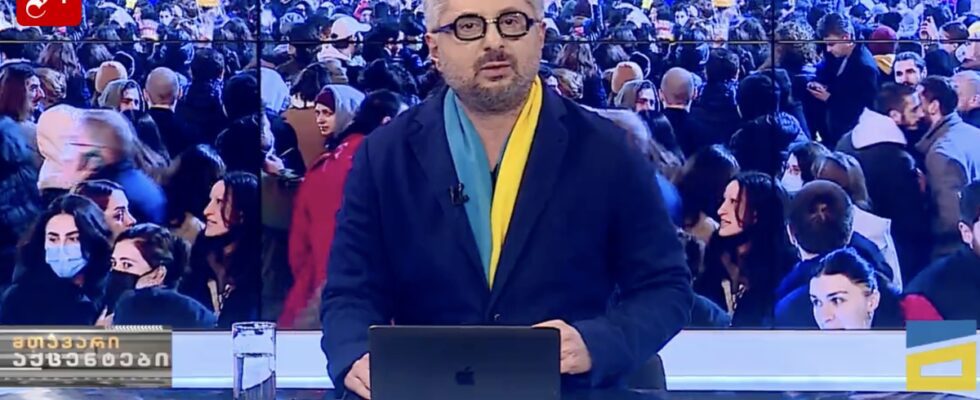So Nika Gwaramia went on the air a day after the start of the Russian war of aggression against Ukraine. In the background you can see pictures of a large demonstration in Tbilisi.
Image: Mtawari
Media maker Nika Gwaramia declared his solidarity with Ukraine and was sentenced to three and a half years in prison. His story shows how Georgia’s rulers are taking action against critical broadcasters.
An the day in May last year that Nika Gvaramia was sentenced to three and a half years in prison, Georgia’s prime minister was on his way to Brussels. This trip, the government announced before departure, was of particular importance because of the meetings with the EU leadership. At the beginning of March 2022, Georgia, like Ukraine and Moldova, applied to become an EU accession candidate. “Full integration with the EU is a top priority for our government,” Prime Minister Irakli Garibashvili tweeted after his meeting with EU Council President Charles Michel. A good month later, unlike Ukraine and Moldova, Georgia was rejected by Brussels: no candidate status. The verdict against Gwaramia weighed more heavily for the EU than the prime minister’s well-chosen words.
The jail sentence for the journalist, media manager and co-owner of one of Georgia’s largest television channels was not the only reason for the EU’s negative decision. But his case is just as important for the country’s future relations with the EU as the way those in power dealt with former President Mikheil Saakashvili, who was allegedly poisoned and critically ill in prison. If the verdict against Gvaramia is upheld by the Supreme Court in Tbilisi in the current trial, Georgia will not receive candidate status this year either. In June last year, following Brussels’ decision, more than a hundred thousand people called for the resignation of the government at a pro-EU demonstration in Tbilisi – these were the largest protests since the Rose Revolution in 2003. This week, a broad alliance of civil society organizations and independent media in Tbilisi started a movement for his liberation in front of the prison where Gwaramia is being held.
